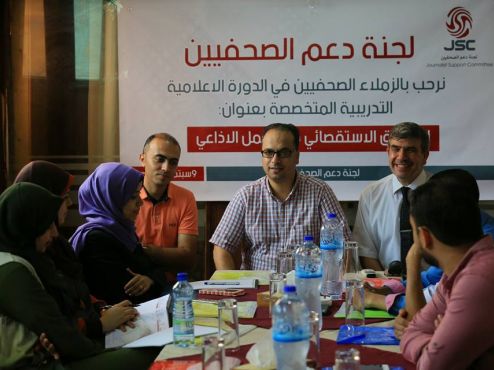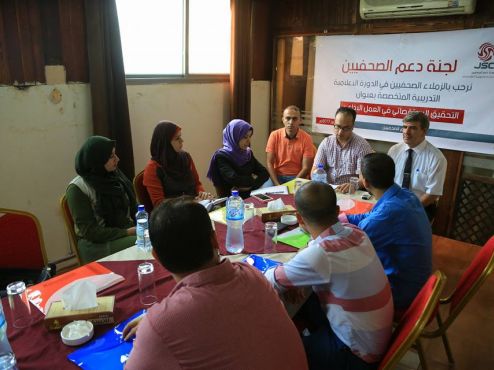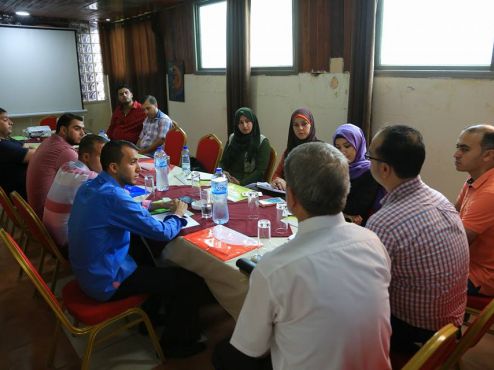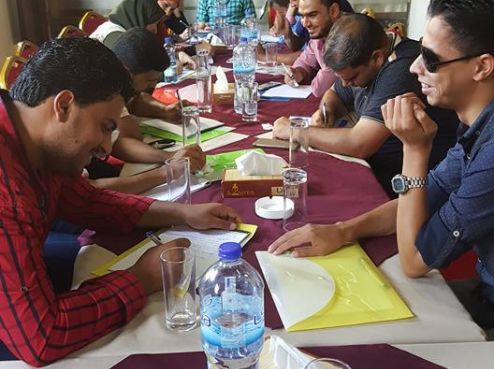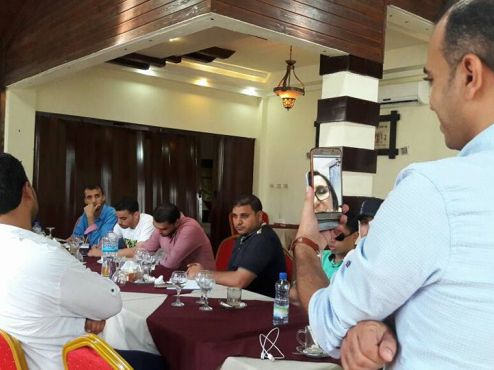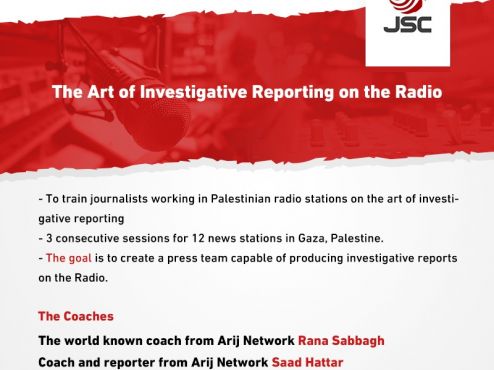Investigative Reporting in Radio Work
2017-09-20 03:56
A special report on the session of "Investigative Reporting In Radio Work"
Preamble
Training as an interactive methodology helps male and female trainees to acquire new knowledge, skills, and trends in a short space of time. Basically, it differs widely from education, since education focuses on establishing the knowledge and implanting the value while training is taken as an inclusive process pertinent to active and fast learning; In a short space of time, male and female trainees attend integrated and intensive training courses that make them acquire the predetermined competences. In achieving the aim thereof, the instructor is at work to transfer the training materials in various different ways.
“Journalist Support Committee”, with an initiative to support journalists in Gaza Strip and based on its view to enhance the Investigative reporting concept in journalism, carried out training courses in the following topics:
- Principles of investigation in radio work.
- Ethics of radio investigation.
- Formulation of the interrogative reporting hypothesis.
- Questioning and information collection skill.
And that with the aim to consolidate and build the capacities of a group of correspondents working in the various local radio stations.
The training report in your hands refers to a comprehensive presentation of the ins and outs of the training process. It illustrates the methodology being adopted during the training and the relevant outcomes and points out to some images and to the applied the training matrix.
Aims of the training
- Raising participants' awareness about the principles of investigation in radio work.
- Promoting the ethics of journalism survey in radio work.
- Training participants to formulate the hypothesis of investigative reporting.
- Developing the knowledge skills about the methods of field interrogative research.
Outcomes of the training
Enabling 13 radio correspondents in Gaza Strip to elaborate hypothesis about the interrogative survey as a preamble to go into the most complicated broadcasting field, because of the fact that it relies on a process of research methodology that differs from the traditional one.
| No. | Name of the Institution | Participants’ Name |
| 1 | Al-Quds Radio Station | Muthana Al-Najjar |
| Bassel Al-Qadi | ||
| 2 | Al-Aqsa Radio Station | Ayman Taysir Atiyeh Daloul |
| 3 | Al-Sha’eb Radio Station | Mohamad Al-Aydi |
| 4 | Al-Ra’i Radio Station | Ahmad Abed Al-Karim Al-Amriti |
| 5 | Al-Asra Radio Station | Mohamad Ihsan Ali Al-Shena |
| 6 | Al-Aqsa Live Radio Station | Hamza Farid Radwan |
| 7 | Al-Iman Radio Station | Mohamad Kher El-edine |
| 8 | Al-Risala Radio Station | Rola Issam Abu Hashem |
| 9 | Al-Irada Radio Station | Abed Al-Aziz Zaki Akram |
| 10 | Al-Isra’a Radio Station | Dua’a Hassan Abu Jazar |
| 11 | Hawaa Radio Station | Bara’a Al-Babili |
| 12 | Al-Watan Radio Station |
Fida’a Halas |
Training Schedule
The following schedule sets the timetable of the training as what concerns the plan and the daily training hours.
| No. | Tasks |
Time Frame
|
|---|---|---|
| 1. |
|
5 training hours per day |
| 2. |
|
5 training hours per day |
Training Matrix
The matrix describes the training titles and contents on daily basis and clarifies the focal points and the applicable training tools and methods:
|
Days |
Training material |
Time |
Way of presentation |
|---|---|---|---|
|
First |
|
6 hours including two breaks for 30 minutes (15 mn / 15 mn) |
|
|
Second |
|
3 hours including two breaks for 30 minutes (15 mn / 15 mn) |
|
Training activities
- Forming groups to seek online information and to check out the resources.
- Investing the search engines.
- Gathering available statistics via the web.
- Building database about the research topic.
- Writing the hypothesis and verifying the relevant mechanism of proof.
Training skills
- Going deeper into analyzing and discovering ideas
During the training, the present skill process enables the participants to learn how to discover and analyze the investigatory ideas, to determine their strength and relevance to the public as well as to distinguish between hard and easy access to the information.
- Targeting
The present skill aims at setting priorities for discussing the public issues by way of radio survey and to adopt intelligence criteria when selecting the ideas likely to serve the widest spectrum of the public.
Durability (after training)
A group including the participating members has been established in order to coordinate the efforts to follow-up the course of the investigative reporting, without prejudice to the investigation's hypothesis and methodology.
Recommendations
- Launching initiatives to promote and financially support investigative journalism for radio correspondents.
- Maintaining the investigative reporting methodology to ensure achieving the desired impact.
- Investing all resources in order to establish the most influential hypothesis as per the public opinion issues.
- Supporting the radio investigative reporting, considering the fact that that is put at a disadvantage vis-à- vis other print and visual means.
- Increasing guidance and orientation training hours and tracking the legitimacy and the working process of the investigation.
- Activating the competitions to incentivize the participants to produce qualitative radio investigative reporting.

